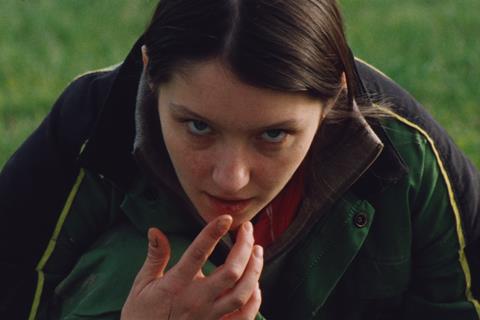Polish actor Maria Wrobel impresses in Julia Kowalski’s atmospheric second feature

Dir/scr: Julia Kowalski. France/Poland. 2025. 98mins
Purification requires sacrifice in Her Will Be Done, a murky rural horror in which a young woman Is desperate to escape the drudgery of her current life and the sinister influence of her bloodline. Julia Kowalski’s long awaited second feature is an atmospheric but overwrought combination of lurid imaginings and small town prejudice that might attract genre fans drawn to more offbeat fare.
Atmospheric but overwrought
It is 10 years since Kowalski’s debut feature Raging Rose was part of the ACID selections at Cannes. Now, her second feature expands on themes explored in her short I Saw The Face Of The Devil (2023) and reunites her with that film’s lead Maria Wrobel. Here, Wrobel plays Nawojka (known as Naw), a young woman living on a small French farm with her Polish father Henryck (Wojciech Skibinski) and brothers Tomek (Przemyslaw Przestrzeiski) and Bogdan (Kuba Dyniewicz).
Downtrodden and dowdy, Naw exists to clean, cook, organise and be the butt of endless jokes. Her ambition to study veterinary medicine is never taken seriously. There is little nuance to brothers who are depicted as repellent boors, whose every inconsiderate demand makes us more sympathetic to Naw’s plight. Her kindly father’s greatest fear is that she might turn out like her late mother, who was possessed by evil. Is his concern just another form of control? Daily prayers and the wearing of a Saint Benedict medallion are part of the protection against her fate.
Her Will Be Done unfolds in waterlogged fields, abandoned sheds and mucky barns, with a gallery of local residents to rival the worlds of Bruno Dumont or Alain Giraudie. This is a backwater populated by predatory men and narrow-minded women. Cinematographer Simon Beaufils lends the film the grainy look of a 1970s feature, utilising a muddy colour palette interspersed with the use of red.
If Naw is a latter-day Cinderella, then her Prince Charming might turn out to be Sandra (Roxane Mesquida, channelling Beatrice Dalle), a sultry bad girl who returns to the area to dispose of her family home. Decked out in a leg brace, leather jacket and cut-offs, she is every inch a femme fatale, from the cigarette dangling from her lips to the contempt for anyone who challenges her.
Kowalski sets up all kinds of expectations, from a dangerous liaison between the two women to an Exorcist-style tussle between good and evil for the soul of Naw. The result is never quite that straightforward, muddied by the fact that brief flashbacks provide only passing insight into how history may be repeating, and that we know little of the events that have made Sandra such an outcast.
We do see, however, the livestock falling victim to a mysterious ailment that manifests itself in fields speckled with icky deposits that look like patches of discoloured membrane. We also know how Naw suffers as she attempts to fight off possession by her mother’s spirit. Wrobel gives a committed performance that expresses Naw’s torments with an intense physicality, grimacing, drooling, screaming and distorting her body. She contrasts that with a placid, bug-eyed stare as she lapses into trances that can feel like the lull before the storm. Wrobel’s commitment to the character helps unify the disparate storylines in what emerges as a tale of transgressive women in unwelcoming places, and what it takes to survive.
Production companies: Grande Ourse Films, Venin Films, Orka Films
International sales: WTFilms, sales@wtfilms.fr
Producer: Estelle Robin You
Cinematography: Simon Beaufils
Production design: Anna Le Mouel
Editing: Isabelle Manquillet
Music: Daniel Kowalski
Main cast: Maria Wrobel, Roxane Mesquida, Wojciech Skibinski, Raphael Thiery
























